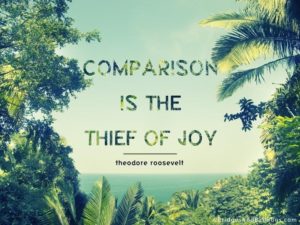Comparison is the thief
How do we compare ourselves with others?
Social psychology distinguishes between two variants of comparison. The first of them: comparing ourselves upwards concerns a situation in which we relate our own situation to people who are in a better position than we are. Mostly, such a comparison causes frustration, jealousy, and even a sense of hurt and regret. The second option is to compare yourself down. In this case, we see ourselves as a person who is in quite a good position compared to others, which is why we assume: “Others have worse than me.” Usually it is accompanied by positive emotions, relief and peace. In both dimensions it doesn’t have to be so gray and gloomy. You can compare yourself to people, even to motivate yourself or to be inspired.
Comparisons occur almost everywhere in every field. The elements triggering such a comparison mechanism can be: earnings, visual appearance, social media, social position, interpersonal relations, personal development, etc. Of course, it is worth adding here that not everyone must have some inconvenience or a noticeable impact on the present.
Possible (negative) consequences of comparing yourself to others:
– The end result: It is often the case that when we look at the achievements of others, we see only the result of success, not the effort that someone has made to reach the desired goal. This may mislead us because the real picture of the situation is blurred. Unwanted thoughts may appear: “I will never succeed,” “It came so easily to him/her.”
– Pressure: continuous comparison consumes a multitude of time. Overloading with content presented by people to whom we refer to our own situation may cause the pressure to do something that we do not necessarily need at a given moment of life. It is worth thinking about how much we spend each day looking at others, and then what feelings it causes in us. Is there motivation to act or just the opposite?
– Jealousy: Let’s imagine a situation where a loved one has what we really want. Let us use the so-called “Perfect life”. A beautiful home, a wonderful family, great work, a luxury car, traveling around the world (…) Let’s assume that we work very hard, and even half of these elements do not have. It is likely that jealousy will sprout in our head (but does not have to), which in turn may affect our interpersonal relationships with that person.
– Decreased confidence: self-confidence is a quality that everyone has. Apparently, it is the most frequently mentioned reason for various failures, life difficulties, but also for achieving successes. Some have a little more, others a little less. Either way, by notorious comparison with others, its level may decrease slightly. The combination of skills with the abilities of the other person causes a turmoil in self-perception.
Comparing yourself with others always results from low self-esteem. When we assess others as better, we lower our self-esteem. In turn, when we see others as inferior, we need to cover up our low self-esteem and often repressed shame. Extreme cases are perfectionists and narcissists – their self-esteem is so low that their whole lives are focused on repelling feelings of shame by striving for perfection in every field.
How do you stop comparing yourself with others?
– Watering your lawn: in one of the foreign magazines I read that we do not grow green grass in front of our house focusing on the neighbor’s garden, we do it primarily for our own needs. Our lawn will not look better when we passively look at gardens from behind the fence. If we focus our attention only on observing the actions of other people, then we lose time that we could invest in ourselves.
– If comparing – then with yourself: there is no better person to compare with. Through such action, we can do a lot of good for our own development and self-realization. Helpful questions can be: What can I do to become a better version of myself? How can I make my life better?
– Gratitude for everything you have: gratitude has probably already appeared on all pages devoted to development and psychology. No wonder, because it is an amazing tool that works wonders – really. Every time you focus on what other people have, remember what you are grateful for. Such a shift of attention from what you do not have to what you have can be very helpful.
– Uniqueness : a few years ago, with very close friends, we had our saying, which we often repeated : How many people, so much DNA! If I think about it now, I find it perfectly reflects my current approach in the field of comparisons. Each of us is unique, has its own pros and cons. Despite similar goals, we all have an idea to achieve them. Perhaps the roads to their implementation will be winding, and maybe quite simple. The most important thing is to often remind yourself of your uniqueness and use it in everyday life.
Start to invest your precious energy into you – you deserve it.

